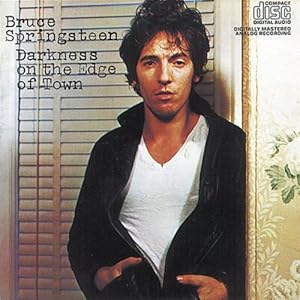
To discuss this album, it really becomes important to talk about the huge events that shook Springsteen's career between the release of Born to Run in 1975, and this album 3 years later. During this time, Bruce ejected Mike Appel as his manager and installed Jon Landau. Ultimately, Landau, Springsteen and E-Streeter Little Steven Van Zandt would produce Darkness on the Edge of Town, but the act of removing Appel resulted in a long, complicated legal battle.
Springsteen was left in a position where the very ownership of his songs was in question, and a court injunction prevented him from releasing an album during the case. Springsteen reportedly felt his career was being held for ransom, and he was left to play live shows to pay the bills, and record songs that he had no idea when they might be released.
In Star Wars-speak, it was a dark time for the E-Street Nation.
Darkness is definitely, well, darker than Born to Run, with song after song that embrace anger, loss and failure over the nobility of the previous album. The characters of Darkness are, in many cases doomed. From the endless circle of alienation of "Adam Raised a Cain," to the day-in-day-out death march of "Factory," these are not songs of escape and growth, but of isolation and endurance.
I mean, this section of "Racing in the Streets" tends to exemplify the album:
But now there's wrinkles around my baby's eyesThere are a few moments when the mood lightens, and with the opening track, "Badlands," Springsteen ALMOST reaches for that hope and joy that infused the previous album. I tend to believe he wanted it there, in the first song, to at least celebrate that the album was actually released. It's a statement of rebellion, of escape, but not in the sense of freedom that you find in "Born to Run." "Badlands" give us a freedom you have to fight for;
And she cries herself to sleep at night
When I come home the house is dark
She sighs "Baby did you make it all right"
She sits on the porch of her daddy's house
But all her pretty dreams are torn
She stares off alone into the night
With the eyes of one who hates for just being born
Workin' in the fieldsWe also find some sens of redemption and hope near the middle of the album, with "The Promised Land," which Springsteen has always cited as one of his favorites. Again, the song embraces effort and suffering, but also gives us the sense that there is a place, a "Promised Land" where we'll all be treated fairly and justly. Yet, this place is only mentioned in the final line of the chorus, and no explanation is offered. It's a goal, a hope, something to be aspired to. It's there, but a lot of folks ain't gonna find it.
till you get your back burned
Workin' 'neath the wheel
till you get your facts learned
Baby I got my facts
learned real good right now
You better get it straight darling
Poor man wanna be rich,
rich man wanna be king
And a king ain't satisfied
till he rules everything
I wanna go out tonight,
I wanna find out what I got
Yeah, in a way, Darkness is Springsteen's "reality slaps you in the face" album.
One of the interesting parts of this era was that, in the face of not being able to release anything, Springsteen wrote and recorded a LOT of music. Tracks he gave to Patti Smythe, "Because the Night," Greg Kihn, "Rendezvous," and the Pointer Sisters, "Fire," were born in this time. Literally hours of music was recorded, and very little actually made the album. This November, Springsteen will be releasing a 2-CD set called The Promise containing many of these tracks. It's also going to be in the big Darkness on the Edge of Town reissue set. A good number of Springsteen fans are feeling this is a "Holy Grail" moment.
I don't know that I'd go that far. In a lot of ways, I like Darkness more than Born to Run. It certainly hits harder, and it's far more emotionally raw. There's a truth, and fuller and more honest view of the world around us in this album. During the Tunnel of Love tour, Springsteen skipped playing "Born to Run" with the full band to play it alone with his acoustic guitar and harmonica. He would preface this performance with a a short speech that would culminate with the simple phrase, "nobody wins unless everybody wins."
It's a fine, pure sentiment. A statement of purpose and hope. It is how the world ought to work. The Springsteen of Darkness on the Edge of Town, through his own travails (which would seem less than Earth-shaking to us), had learned that not everyone wins, and you'd better be ready to fight, hard, to get there.
When Springsteen play "Badlands" live, it's a huge sing-along moment. Probably the most powerful unifying moment in the shows I've seen. I think the crowd knows Bruce is speaking a truth, and that their conviction is what can make or break their world. When the one, epic line comes around;
For the ones who had a notion,...it's a catharsis the likes of which I rarely feel.
a notion deep inside
That it ain't no sin
to be glad you're alive
The world may beat you down, crush your dreams, but it doesn't change your value as a human being. You are powerful, you are free, and if you sing along hard enough, no matter what the world might have for you outside that arena, you truly can be glad you're alive.
No comments:
Post a Comment